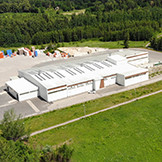
In commencing a major expansion of the company, this spring Troja is starting production in a new woodworking plant at Saulkalne, where the buildings span an area of over 5,000 m². A double-ended CELASCHI P60 profiling machine has been bought, with which various edges and profiles are integrated into large components. In developing the idea of creating its own fleet of electric vehicles, a DC 50 kW electric car charging station has been installed within the company’s premises. It is planned that the charging station will soon be available for public use.
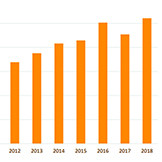
Troja SIA has attained the biggest turnover in its history – in 2018, its turnover exceeded EUR 25 million, EUR 2.5 million investments were made and jobs were provided for over 160 employees.
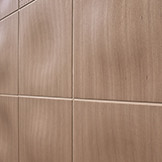
The existing range of products were augmented by curved glued 3D panels for wall and ceiling finishes. The panels are used for decorative purposes. Thus, in combination with perforation and additional materials, they absorb sound. Our range of production equipment has been augmented by the innovative USEON WPC sheet extrusion line, which produces the composite timber-polymer materials that is essentially used in the production of formwork. In collaboration with Riga Technical University, composite sheets of various colors, densities and elasticity are currently available.

The product range has been augmented with two new product groups. Acoustic panels that are intended for sound absorption, improved acoustics and fulfilling a decorative function, as well as a set of children’s furniture that includes chairs-toy boxes and a table.

The company has bought two new CNC machines: SCM Accord 30 FX un Morbidelli Author M400 for specialized production of perforated components.

A new programmable (CNC) Pratix Z5 milling - drilling machine has been bought for processing more complicated components. A CCFI project "Complex Solutions for Reduction of Greenhouse Gas Emissions at SIA TROJA, BAUSKAS STREET 143, RIGA" has been commenced.

This year, the skate ramp park built several years ago next to SIA Troja’s plant at Bauskas Street 143 has been renovated.

Troja SIA obtained the Certificate of Quality Management System ISO 14001:2004. By developing sporting good sector Troja SIA starts the plywood skateboard and skimboard production.
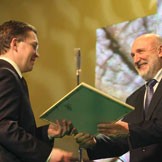
In the beginning of 2008 Troja SIA was the winner of the annual prize Zelta Ciekurs in 2007 (Golden Cone), it is a prize of the Ministry of Agriculture, Forestry Sector, in nomination For Innovative Entrepreneurship. In 2008 Troja has taken over production of office furniture from production plant Latvijas Berzs of Latvijas Finieris AS.

Troja SIA obtained the Certificate of Quality Management System ISO 9001:2008. In the end of the year The Ministry of Children, Family and Integration affairs of the Republic of Latvia granted the status of a Family Friendly Entrepreneur.
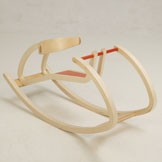
With employees of Latvijas Finieris AS was developed a new, modern model of rocking chair - named EGG, which in 2005 was awarded with prize of journal DEKO for the best industrial design.

In 2004 Troja SIA has started the producing of traffic signs and information boards, also a new product for children and young adults – skateboarding ramps. In January 15th Troja SIA receives the FSC (Forest Stewardship Council) Wood Custody of Supply Certificate.

Due to constantly increasing volumes of the production, in 2003 Troja SIA purchased and installed additional production equipment and machines of high productivity, also there were built new storehouses.

By continuous investments in developing new production machines was purchased the first CNC machine Record 240 produced by company SCM.

This year "Troja" invested in production and technical provision improvement : were built new production facilities and modernized cut–to-size machine Swabedissen S-50.

In October 1st on basis of state owned company the Limited liability company Troja was established. During this time the main activity sphere of the enterprise was production of wooden toys. The most popular product - rocking horses.

In November 26th the status of enterprise was changed. The company status was changed to state owned company Troja.

In May 8th a small joint company Troja was established. Founders – Plywood Production Union of Latvia and Latvenergo. The enterprise produced consumer products – wooden toys.

Till 1990 the plywood production plant Furniers was owned by Plywood Production Union of Latvia and it produced wide range consumer products. In 1972 the production of children rocking chairs was started.

Since this year in Latvian SSR Forest Industry factory "Furniers" were produced radio cases for such radio as VEF radio, Rapsodija etc.

Land 73/91 in Bauskas Street 143 was assigned to match factory Kometa. In 1946 in Bauskas Street 143 garage of match factory Kometa was established (Order of Executive Committee of Riga’s Lenin district No. 1099 from 13.11.1946.).

Later Komet A/S was included in structure of Latvian SSR Forest Industry match factory "Vulkans". After 1941 in Bauskas street 143 was located the main match factory storehouse of Latvian SSR Forest industry match factory Vulkans, it was planned to rebuild it for garage needs.
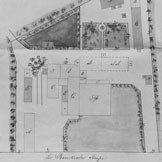
Officially Knopp paper fabric existed until 1940, however industrial activities there was only till 1925th. After 1902nd Aron Girshman was the owner of this land and some years later he started to build match factory. In 1935 Latvian Bank bought this land. Until the 1940 buildings in Bauskas street 143 belonged to the match factory Vulkans A/S.
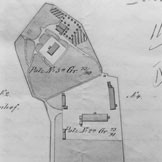
The oldest economic activity in the territory of Bisumuiza was fixed yet before The Livonia War in Katlakalns flour-mill. The owner of Katlakalns mill was Riga city, but in 1768th it was sold to a private person. In 1848th the complex of mill where was also included oil fabric, outbuildings and garden, was bought by the owner of Bisumuiza county – Jacob Branderburg. In 1871st Ludwig Fridrih and Gumal Gustav Knop bought the holding of Katlakalns mill. By using existing buildings and building new blocks there was a established paper factory, which now is known as Knop’s paper factory.